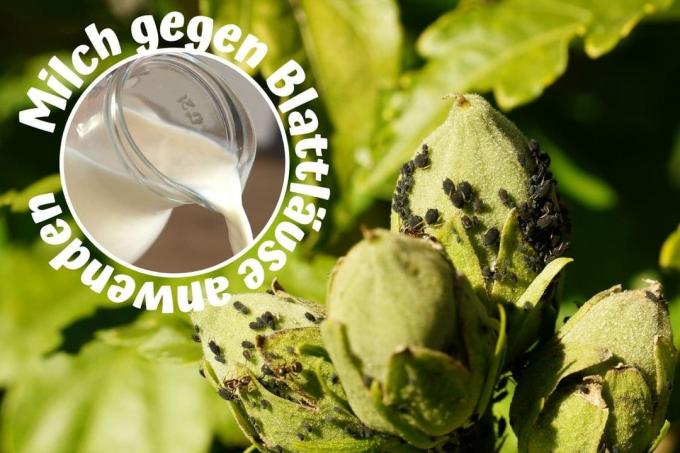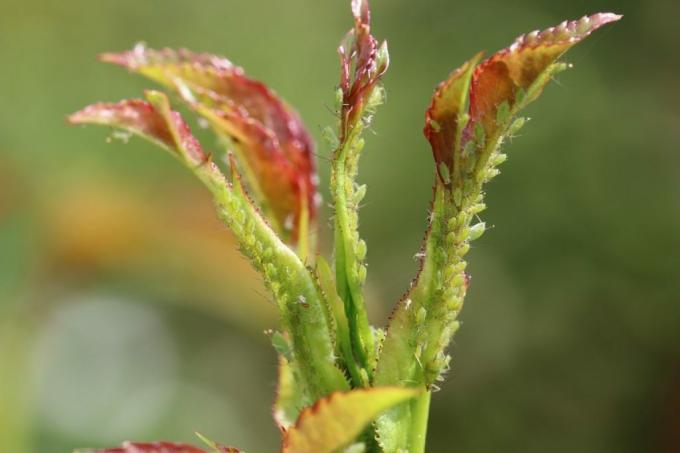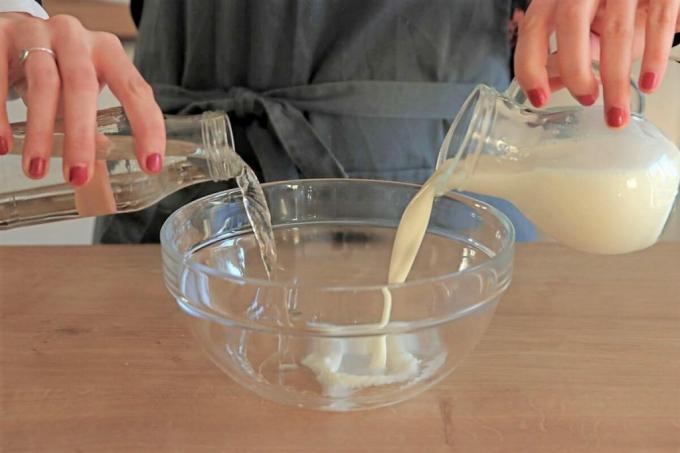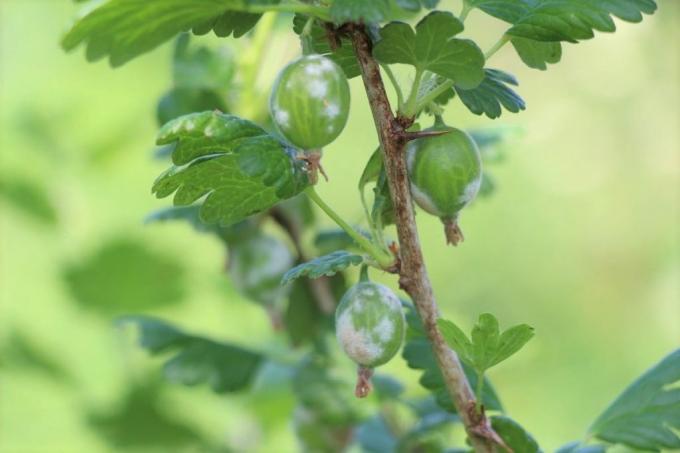
table of contents
- Aphid (aphidoidea)
- Fight aphids with milk
- Time of application
- This is how milk works against aphids
- frequently asked Questions
Lice are a horror for every hobby gardener and a danger for every plant. Numerous pesticides are available in specialist shops. If you want to fight aphids without chemicals, you can use regular milk.
In a nutshell
- Aphids are one of the most common pests in the garden
- occur in colonies and damage useful and ornamental plants
- Activity from spring to autumn
- Milk and other home remedies help fight insect pests without chemicals
- Milk-water mixture easy to make and easy to use
Aphid (aphidoidea)
It only grows one to two millimeters in size, but the damage that the small insect does in the garden is enormous. In addition to snails, lice are the most common plant pests. More than 600 species of aphids can be found in Central Europe. They are mostly black, brown, or red green colored. The insects sit tightly packed in groups on the shoots of the plants.
Frequently infested plants

- rose
- hibiscus
- Angel trumpet
- Snowball
- Pfaffenhütchen
- Bean
- Mirabelle
- honeysuckle
- Farm jasmine
Signs of aphid infestation
- visible aphid colonies on the underside of the leaves
- poor stature
- dry or curled leaves
- Leaves fall off
- There is no bloom
- k (l) a fruit
Note: An increased number of ants in the garden can indicate an aphid infestation. Ants love the honeydew that the lice excrete after consuming the fresh greens.
Fight aphids with milk
instructions

- In preparation, remove the aphid colonies from the plant with a soft brush. Be careful not to damage the parts of the plant.
- Mix half a liter of milk with a liter of water.
- Pour the mixture into a squirt bottle.
- Spray the aphid-infested plant thoroughly with this milk-water mixture. Also wet the undersides of the leaves.
- Repeat the procedure every two days until no more aphids can be seen.
Note: The effect of the spray mix can be significantly increased by adding a tablespoon of oil.
Time of application
Apply the milk spray mix in the morning on dry days. This ensures that the infected plants can still dry off well after the treatment.
Tip: We recommend spraying endangered plants such as roses preventively with the mixture every two weeks. This can significantly reduce the likelihood of an aphid infestation.
This is how milk works against aphids
Cow's milk contains lecithin. Lecithin is an active ingredient that wraps itself around the aphid when the liquid is sprayed on and prevents the supply of oxygen. As a result, the pest dies.
Other possible uses

By the way, you can use the milk mixture to combat pests on garden plants without hesitation. It is almost always available and much cheaper than commercial insecticides. The spray mix also provides preventive protection against fungal diseases such as mildew. Simply prepare and treat the mixture according to the instructions Roses and mildew susceptible plants with it.
Note: Create a good habitat for beneficial insects in your garden. Aphids don't stand a chance where lacewings and hoverflies feel good. The fly larvae suck out the lice so that only the shells remain on the plants.
frequently asked Questions
Healthy, strong plants can survive aphid infestation better than sickly, weakened ones. Provide good site conditions and do not fertilize the plants too much. An excess of nitrogen in the soil weakens plant growth. We recommend mixed cultures with lavender, sage, rosemary and thyme. These herbs deter aphids and other pests.
Home remedies such as milk water or plant broths contain no chemical ingredients and have no harmful effects on the environment. Those who rely on natural means of pest control make an important contribution to the preservation of biodiversity. You should avoid chemicals, especially with crops that are used as food.
You can use fresh milk and long-life milk equally to control aphids. Use whatever type of milk you have in stock. It is crucial to react as quickly as possible to a visible aphid infestation.



